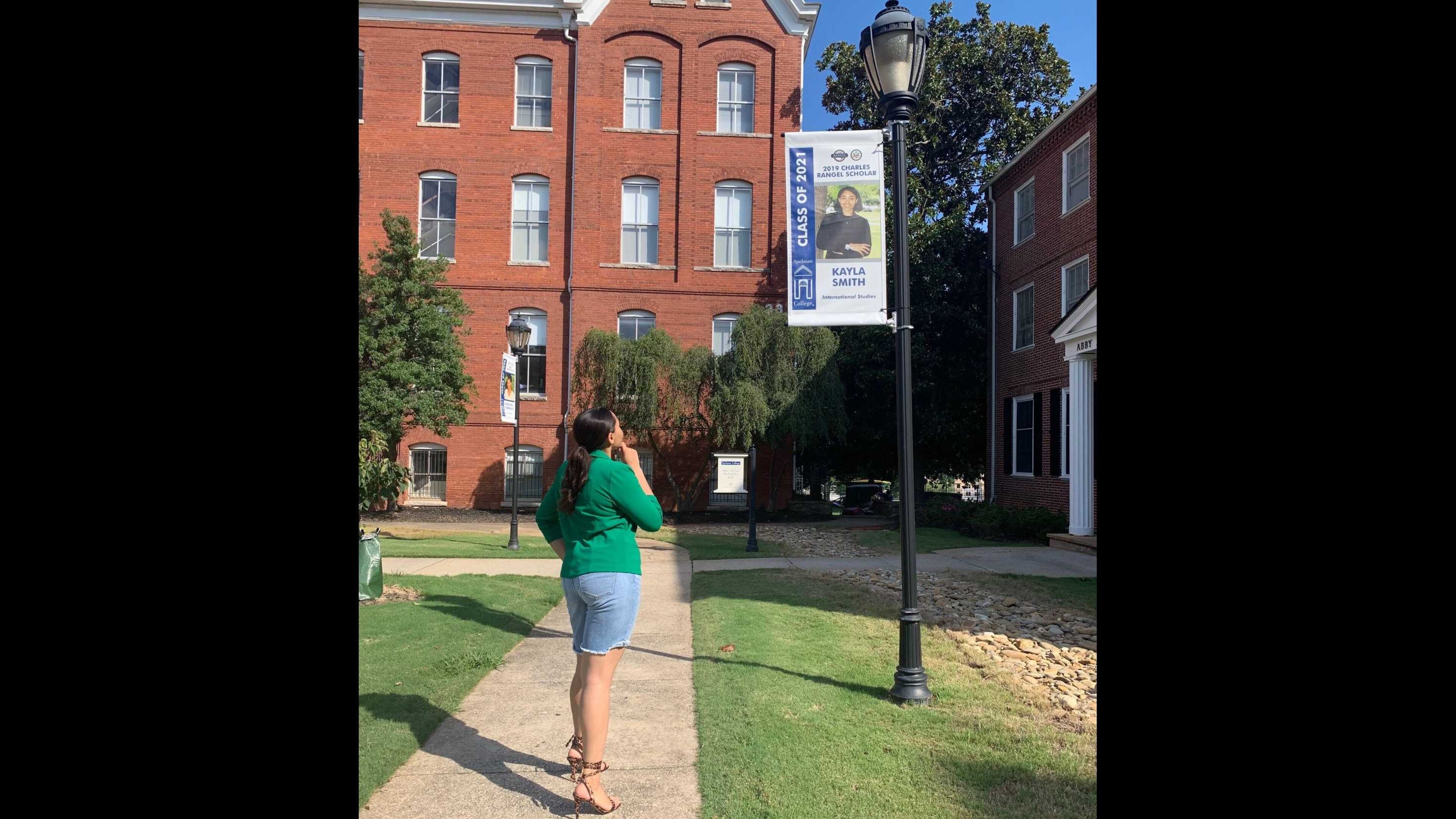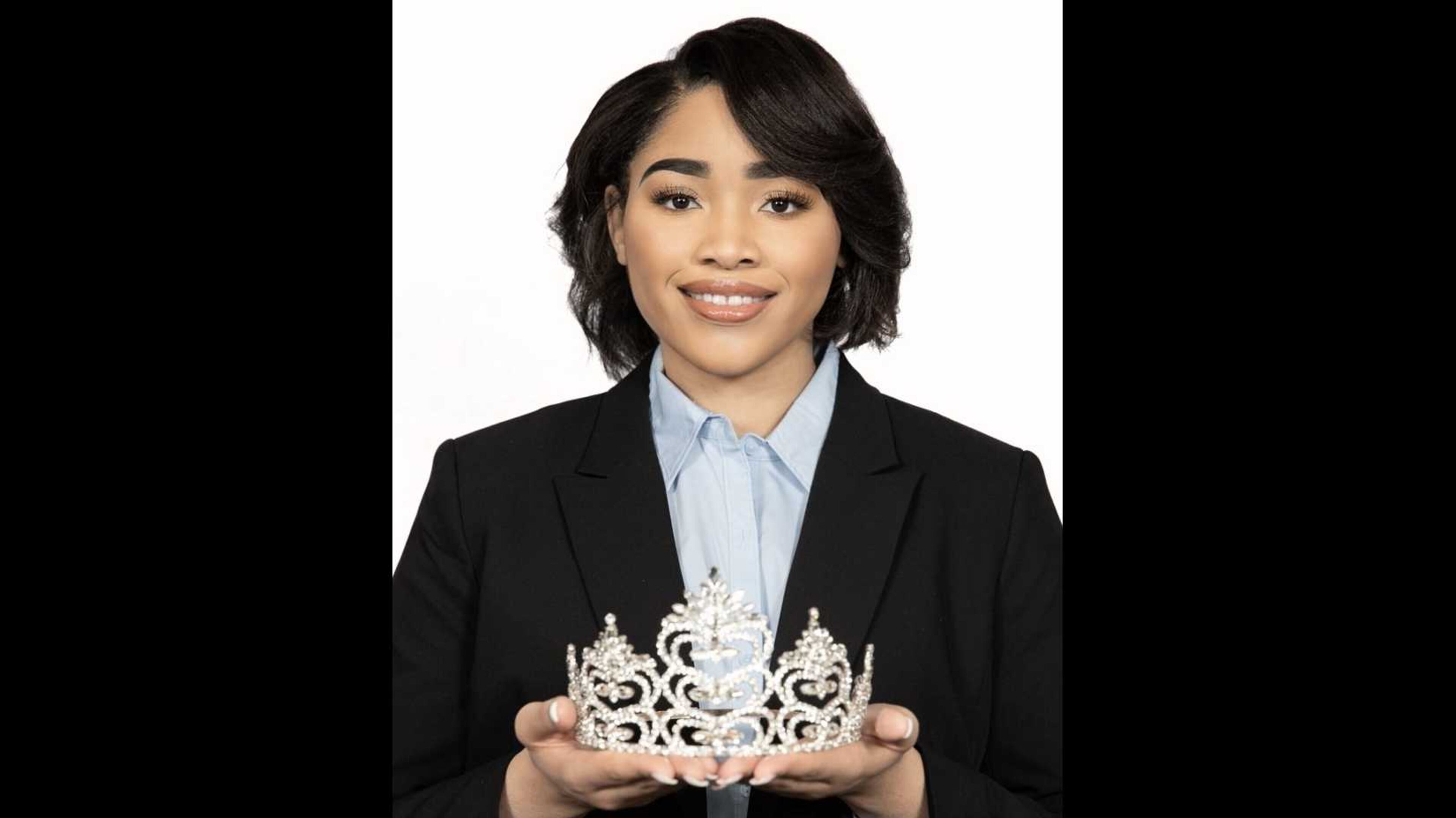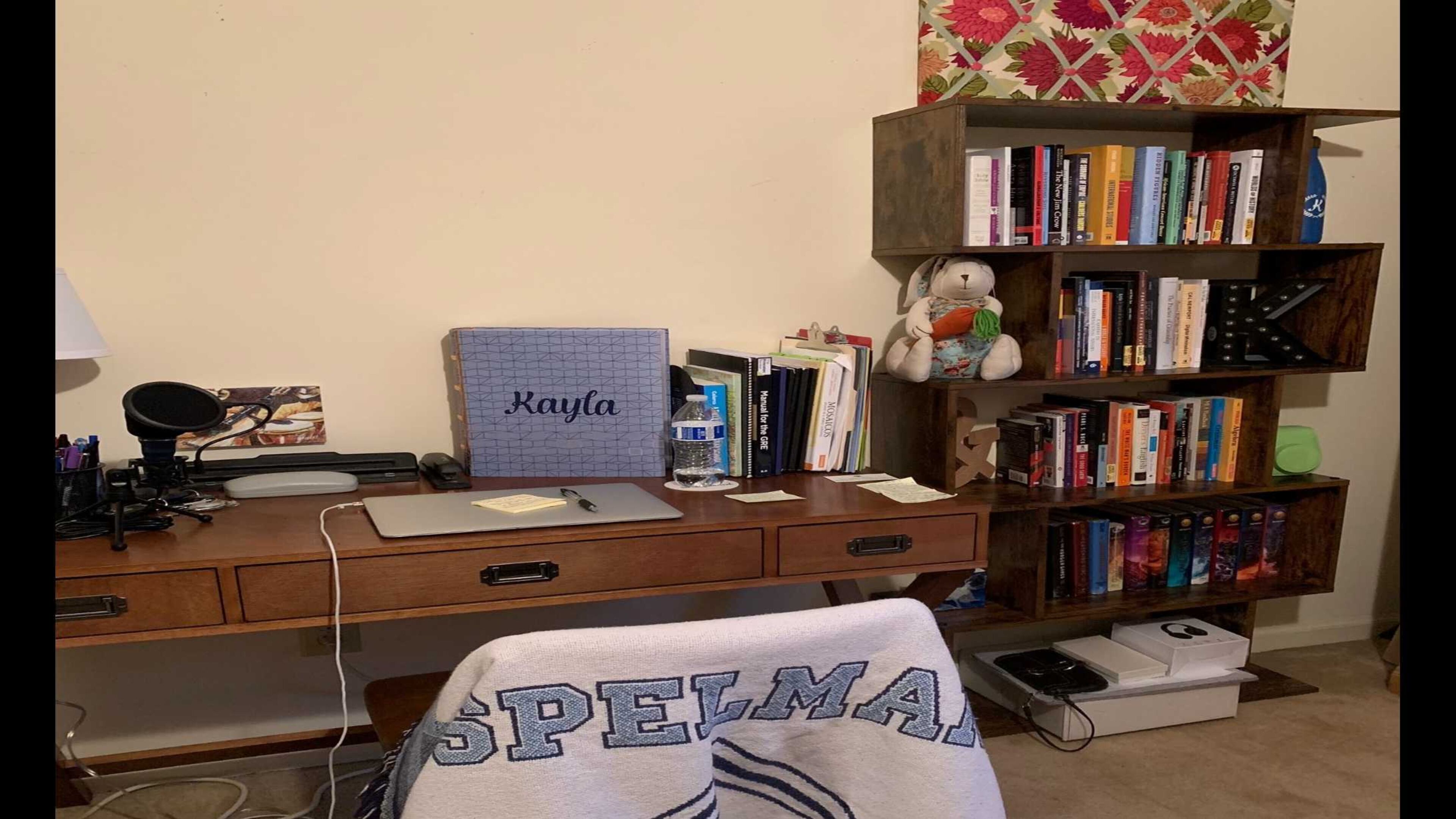College and the coronavirus: The student activist
The Atlanta Journal-Constitution is following the lives of faculty and students like Kayla Smith at various colleges and universities in Georgia throughout the first full academic year since the coronavirus pandemic began. We will publish periodic reports about them. This is the third of these articles.
Multitasker.
The word doesn’t seem big enough to encompass Spelman College senior Kayla Smith.
On the day the Joe Biden-Kamala Harris ticket was declared winner of the 2020 presidential race, Smith was making final preparations for a podcast about the election and plans with her friends to engage other young people to return to the polls for Georgia’s two U.S. Senate runoffs.
“Today is a small victory, and I’m excited for the work my peers and I are going to engage in to hold this new administration accountable for implementing legislation that is equitable and value the intersectional lives of all citizens,” Smith said in a text message to a reporter.
Although Smith — like many of her peers — is critical of some Harris' decisions as California’s attorney general, her text continued with a note of personal satisfaction about the historic element of this election. Harris, the first woman elected vice president, graduated from Howard University, which like Spelman is a Historically Black College & University.
“Truly proud to be a product of a HBCU,” she wrote.
After a spring and summer of nationwide protests against systemic racism, the demonstrations often led by college students took on a different form this fall. While the coronavirus pandemic has curtailed social activism on many college campuses — Spelman’s fall semester classes were online — it has not slowed Smith’s interest in combating racial, gender and other forms of inequity. Her primary approach to addressing such issues is through the podcast, called “The Blue Record,” that she helped create. Smith also joined protests in Atlanta and is part of a group that mentors students via Zoom who attend Dunbar Elementary School, located a mile away from Spelman.
Mitchell Smith, Kayla’s dad, explained in his succinct style his daughter is someone who “would like to see things improve.”
“This is Kayla,” said her mother, Kimberly Jackson-Smith, a Spelman professor. “She thinks big. She goes big. That’s what we taught all of our children.”
‘It takes a toll
In addition to the podcast and mentoring, the 22-year-old Smith has been working on graduate school and fellowship applications. She’s also had duties as part of her position as 1st Attendant on Spelman’s homecoming court. There were thesis papers for her to write, and sometimes she picked up dinner for the family.
Some mornings she felt drained. One day at the start of the semester, Smith made a list of everything she had to do.
“I have a lot on my plate, and to look at that, I felt overwhelmed,” she said. “If any college student isn’t overwhelmed, tell me your trick.”

The emotional and mental health of students was an issue for college administrators across the country before the pandemic. It’s a greater challenge now as students are prohibited or being told to forgo socializing on or off campus. Georgia Gov. Brian Kemp allocated $11.5 million to the University System of Georgia in August to enhance its mental health services. Smith said some classmates have tested positive for COVID-19.
Spelman, a private college that is not part of the state system, held several sessions during the fall semester on stress relief. Its student government association posts frequent messages urging classmates to focus on self-care. Superstar entertainer Beyoncé and Peloton, the popular fitness company, partnered on an effort to help students at 10 HBCUs — including Spelman — maintain and improve their health.
“On one hand, the pandemic has made it harder for college students to engage in activism. But on the other hand, the pandemic has catalyzed new student activism as students call on universities to support them in this new environment,” said Satra Taylor, a policy analyst at The Education Trust, a nonprofit that works to close the achievement gap among historically underrepresented college students.
Taylor, 25, was a student activist who holds an undergraduate and master’s degree, respectively, from the universities of Cincinnati and Michigan. Being both, she said, is daunting.
“Student activism is free labor,” she said. “It takes a toll on students’ mental and physical health.”
Undaunted
Smith has many of the attributes Spelman trains its students to be. Articulate, confident, thoughtful. Most of all, undaunted. It’s an important word to Spelmanites. It’s part of the school’s hymn and was the theme of this year’s homecoming.
And she’s particular about her appearance. Smith’s dark, full hair was Instagram ready, styled similar to Michelle Obama’s “Becoming” book cover, for a photo shoot in early November. She fretted over two fingernails that broke the night before while she slept.
Smith, a Georgia native who graduated from the prestigious DeKalb School of the Arts, didn’t plan to attend Spelman. She eyed a college in the Boston area, but saw and heard a few things during a visit there that turned her gaze elsewhere. Smith visited Spelman with other prospective students and saw the sisterhood, Black sisterhood, that she believed was the best fit.

Spelman is a liberal arts college that is increasingly focused on educating students focused on careers in science and technology as industry leaders face pressure to diversity their workforce. About three-quarters of its students graduate within six years, the standard measuring stick for colleges, the highest rate of any HBCU and near the top of any women’s college in the nation. Spelman motto is “a choice to change the world.”
An international studies major, Smith’s grade point average is a near perfect 3.9. The fall semester coursework, though, had its challenges. Spanish, which involved extensive technical grammar, was her toughest class. She wasn’t surprised when she got a 53 on one exam in October. Her professor allowed her to make up part of the exam she did poorly on, grammar. Smith said she received A’s on her other assignments and exams.
Smith wants to become a diplomat. She was selected for Spelman’s Social Justice Fellows Program, which is for students in their junior and senior years. Fellows receive stipends, faculty and alumna mentoring, advocacy training and help with internships.
The Blue Record
Smith decided to start a podcast as part of the program. One of her interests is storytelling. She worked at VOX ATL, a news site for teenagers, while in high school.
“I hope people believe, listen and trust Black women,” Smith said of her mission statement for the podcast, which is on Spotify.
Smith and her team decided no men would be involved in the podcast’s production, saying women are too frequently omitted from various forms of technology.
“Much love to the male species, but this is our space,” she said during the first episode.
Some episodes are about 30 minutes, others are an hour. Past topics have included how Black women are treated in digital spaces, lifting up Black women who’ve been victims of violence and one about the pandemic, titled “The Unexpected Reboot.”

The reboot
Smith’s reboot has involved remote podcast meetings and leaving her dorm. She returned to her childhood bedroom in her parents’ home in the Stone Mountain area. Her parents joke Smith treats their kitchen as if it’s the campus cafeteria.
“What do we have today?,” she sometimes asks.
Smith, the oldest of three siblings, searches for the normalcy of campus life at home. She often talks about her schedule.
“We’re in a pandemic. Your schedule needs to be flexible,” her dad teases in response.
The family has tried to create a routine. Fridays are movie night. Sundays are worship time.
Smith is careful about going out. She attended a Summer Walker concert where everyone watched the Atlanta singer from their vehicles in a parking lot. The Decatur square is one of her favorite places, so she occasionally comes there to escape or think. One excursion came in mid-September when she met a classmate at Fellini’s Pizza in Decatur.
“They’re brief little moments, but I cherish them deeply," she said of the outings.
Smith needs those moments. She often talks about being tired.
“All the screen time, it wears you out,” she said.
Spelman held an online homecoming this fall. More screen time. Smith wasn’t feeling it, despite her position on the homecoming court. She had three fellow applications due and needed to fill out her federal financial aid form.
“I don’t have the time," Smith said in a frustrated tone.
Smith says she took campus life for granted. Her last visit to Spelman was in May, when she purposely had a package delivered there. She recalled walking around campus and stared at a banner of herself noting her selection as a 2019 Charles Rangel Scholar for the International Affairs program.
Smith took three classes during the fall semester. She needed one more class to complete her undergraduate degree, but decided to stretch it to the spring for the possibility she could have her final semester on campus.
She got her wish the week before Thanksgiving, a day before her 22nd birthday. Spelman announced it would allow a limited number of students back on campus for the spring semester. Seniors are among the groups who will have first priority to live on campus.
“I think that the plan is a balance of students wants and needs, the college’s financial needs and the college’s commitment to prioritizing the health of our community,” she said. “As a senior, I was ecstatic to hear that my peers and I will be able to take senior photos, and for those like myself who plan to stay in our current living arrangements, be allowed to commute to campus for in-person classes.”
She got more good news on her birthday. Smith is a finalist for one of the graduate school fellowships.
The post-election podcast
Smith wasn’t on air for the post-election podcast episode, but she was heavily involved in its production. It was recorded the day the election was called for the Biden-Harris ticket. The host and guests, some participating from different states and all involved in activism, talked for more than an hour about their anxiety watching the results as they trickled in. They also talked about student voter registration and engagement efforts and what they say was unfair pressure on Black voters, particularly women, to turn out in high numbers to — as some Biden-Harris supporters described it — “save democracy.” About 90% of Black women voted for the Democratic ticket, the highest percentage of any demographic group.
They ended the podcast expressing their hopes for how the incoming administration can support Black women. The ideas were all from a politically-progressive viewpoint. Biden should meet with social activists, he should address health care, student loan debt and do more on criminal justice reform, they said. They shared information about how students could get involved in the Jan. 5 Georgia U.S. Senate runoffs.
In many respects, this episode reflected the vision Smith and the team discussed during the first episode. Engage classmates. Share information. Celebrate and support Black women. Be a catalyst for change.
“Spelman has uplifted my voice,” Smith said during the first episode. “I want to do that for every Black collegiate woman.”



